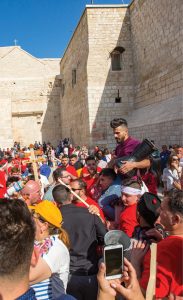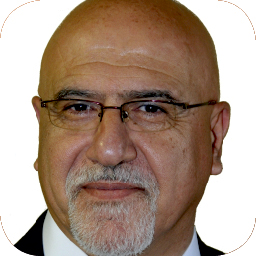Christians in Palestine are part and parcel of the Arab Palestinian nation, and Christianity is deeply rooted in this region. Palestinian Christians have managed to preserve their existence and survive all the unrest and wars throughout their history. This optimistic prophecy comes from a deep understanding and analysis of how Palestinian Christians have maintained their presence over the past 2,000 years and how they have succeeded in preserving their important role in society. Palestinian Christians will remain present in the future despite the ongoing turmoil in this region simply because their strength comes from within and is based on their faith and hope. One of the signs of this faith and hope is the Kairos Palestine document.
On December 11, 2009, a group of Palestinian Christian leaders, both clergy and laypeople, announced the establishment of the Christian Palestinian Initiative and launched the Kairos Palestine document, “A Moment of Truth: A Word of Faith, Hope, and Love from the Heart of Palestinian Suffering.” This document communicates the voice of Palestinian Christians to the world about the reality of the Israeli occupation and calls for support in establishing a just peace and equality between the peoples in our region. Soon after its launch, the Kairos document became more than just a text. It became a living initiative, a movement whose aim is to strengthen the Christian presence in Palestine and to work to end the prolonged Israeli colonial occupation with its structured violence and oppression. While the Kairos document may appear to be a call of pain and desperation, it is fundamentally a call for hope, born of love, prayer, and faith in both God and humanity.
It declares that “the Israeli occupation of Palestinian land is a sin against God and humanity because it deprives the Palestinians of their basic human rights, bestowed by God,” distorting “the image of God in the Israeli who has become an occupier just as it distorts this image in the Palestinian living under occupation.”

Fundamentally, the Kairos document is a message of steadfastness and resistance on both the political and theological levels directed toward the Palestinian people. It tackles an intensely important and often neglected topic: the Zionist hijacking of the Bible itself as well as religious messages that aim to exclude other peoples and cultures from the land and deprive them of their rights. Racism in Israel is not simply a question of laws, or even of measures taken on the ground. Beneath the restrictions of movement, the house demolitions, the evictions, the residency revocations, the arbitrary arrests and interrogations, the administrative detentions, the imprisonment of children, and the violent repression of nonviolent protests lie powerful undercurrents that must be identified and understood. There is, in another words, an official Israeli discourse that monopolizes the history of the land and its people.
In response to this situation, Kairos Palestine was created to add a new voice and to offer new intellectual and theological tools to use in the struggle against occupation. The Kairos narrative is an inclusive one: it seeks peace with justice for all people, both Palestinian and Israeli. Yet emphasizing the need for inclusivity and equality does not and must not preclude Palestinians’ rights to their country. This too is one of Kairos Palestine’s central calls.
Moreover, in calling for support in opposing this occupation, Kairos Palestine not only addresses Palestinian Christians, Palestinian Muslims, and Israeli Jews, it also addresses the church worldwide. It criticizes those “who use the Bible to threaten our existence…” attaching “Biblical and theological legitimacy to the infringement of our rights.” While Kairos calls for “repentance,” it also affirms “the prophetic mission of the Church…to speak the Word of God courageously, honestly and lovingly in the local context” and to support the oppressed.
In doing so, the Kairos document urges Christians to “take a position of truth with regard to Israel’s occupation of Palestinian land,” including “boycott, disinvestment and sanctions as tools of nonviolence for justice, peace and security for all.” The document’s authors celebrate a message of “love and living together,” condemn “all forms of racism,” and call for “a common vision, built on equality and sharing, not on superiority, negation of the other or aggression, using the pretext of fear and security” – a vision through which “justice and security will be attained for all.”
The Palestinian people have suffered dispossession, oppression, land theft, displacement, and expulsion at the hands of the Israeli state for 71 years, including 52 years of direct military colonial occupation on what remains of historic Palestine. Over decades, the official international community has focused on Israel’s right to exist, with very little attention given to the life and rights of Palestinians. Israel’s continuous settlement building/expansion and further confiscation of Palestinian land has severely damaged prospects for a just peace. Racist laws that the State of Israel has enacted support the ethnic cleansing of Palestinians.
The State of Israel, like other oppressive regimes throughout history, doesn’t simply fear the anger of the oppressed. More significantly, Israel fears the steadfast faith, hope, and love of the oppressed – their inner strength. Israel knows that its power and impunity will prevail only as long as people feel weak and hopeless.

The Kairos Palestine document and movement have managed to maintain and sustain hope, and they have achieved substantial results. True to its original promise to serve as a platform for action, Kairos Palestine has achieved much over the past ten years.
• Kairos Palestine has established the international movement “Kairos for Global Justice Coalition.” Today there are affiliates in more than 25 countries on all continents. The movement works to mobilize churches and Christian organizations to work for a just peace in the region and seeks to support and strengthen the BDS call; end the blind loyalty of some churches towards Israel; and end their silence in the face of oppression. More churches are reevaluating their investments to avoid supporting companies and organizations that are either profiting from or supporting the Israeli occupation. Others have definitively voted to divest from such companies and financial institutions. We see that many nations – in increasing numbers – are expressing their support for Palestine and the Palestinians through nonviolent protests, the media, and governmental entities that advocate that Israel be held accountable.
• Pilgrimage and tourism practices are evolving through Kairos Palestine’s “Come and See” campaign. Kairos Palestine believes in the fundamental importance of this call. Many people come to Palestine and Israel as visitors, but they don’t see the actual situation. Kairos emphasizes the power of “seeing” because we believe that people of goodwill – namely, many of the tourists who come here – will be transformed if they can see clearly the reality around them.
• Hundreds of conferences have been organized under the Kairos theme. Thousands have come to visit, speak, and work in solidarity with Kairos Palestine. Hundreds of articles, theses, and other documents have been written about Kairos Palestine in many languages.
• Kairos Palestine theologians have been engaged in a wide-ranging dialogue with theologians from all over the world. Palestinian clergy and lay theologians have written scores of books about (or that reference) Kairos Palestine.
• Relationships between Kairos Palestine and Palestinian civil society are growing in strength and number.
• The Palestinian Kairos youth movement is expanding through Kairos’ efforts.
Today, Kairos Palestine focuses on three main priorities.
1) Working to preserve the Christian presence in Palestine and connecting Palestinians in the West Bank and the Gaza Strip with Palestinians inside the Green Line and in the diaspora, as well as advancing popular resistance and the role of youth movements in the struggle. Kairos Palestine has become a national social movement and a major voice for Christians working in partnership with local communities, churches, Christian organizations, and other national groups, both faith-based and secular.
2) Challenging the theological and political justification of the oppression of Palestinians by promoting an international theological dialogue with theologians from around the world. These conversations and dialogues aim to discourage the blind loyalty to Israel which is demonstrated through silence in the face of oppression; and to lobby churches to stop investing – directly and indirectly – in the occupation.
3) Strengthening and expanding the international advocacy movement, “Kairos for Global Justice Coalition,” whose aim is to mobilize churches and Christian organizations around the world to work for a just peace both in the region and in their own contexts. This movement shares a unified advocacy and lobby strategy to support the international BDS movement, sharing Kairos Palestine’s annual Christmas and Easter alerts which raise awareness about the racist policies and ongoing destruction facing Bethlehem and Jerusalem. Kairos Palestine and its partners will continue to develop the “Come and See” call, mobilizing pilgrims to become advocates for a just peace.

There are many challenges that plague Palestinian daily life, but we refuse to lose faith in a just resolution. Kairos Palestine will not surrender hope as sumud (steadfast perseverance) is our way of life. Despite the challenges and difficulties, we see many signs of hope and look ahead to a time when justice will prevail.
We know that hope does not mean passively waiting for something to happen. Hope stirs us to act bravely. Hope is courage laced with love. Hope is a vivid, living guide to the future. Our primary reserve of hope is grounded in God, in ourselves, and in humankind. We trust our own power, gifts, and creativity. We believe in the power of people all over the world. Throughout the centuries, the bravery, perseverance, steadfastness, cooperation, vision, and love of ordinary people have transformed the world again and again – sometimes suddenly and dramatically and at other times slowly and quietly.
As we observe the tenth anniversary of Kairos Palestine, we continue to raise a voice in the wilderness. Kairos Palestine will continue to provide both a vital symbol of hope and the tools to transform that hope into action – for Palestinians, for people across the entire region, and for people around the world. Kairos Palestine will continue to shape and empower Palestinians’ legitimate, creative, and ultimately transforming popular resistance – a resistance driven by love, not by hatred and revenge.
In the end, Kairos is winning because, despite the bloodshed, hardship, and injustice, there are people and communities who dream of “a new land and a new human being, capable of rising up in the spirit to love each of his or her brothers and sisters.” (Kairos 10)
Rifat Kassis has over 30 years of experience working in the Middle East, Northern Caucasus, Central Asia, and Europe. He founded Defense for Children International Palestine and was elected world president of the international movement for two terms. He is a co-author of the Kairos Palestine document and has been the general coordinator of the Kairos movement since its inception in 2009.
He has published two books, Palestine: A Bleeding Wound in the World’s Conscience and Kairos for Palestine. In addition, he has contributed to 17 books in various languages.


